
Planning a trip to Bangkok? You're in for a treat! 🌆 Whether you're a culture-loving explorer, a foodie on the hunt for world-famous street eats 🍜, or a savvy shopper eyeing those vibrant night markets 🛍️—Bangkok has something that'll sweep you off your feet. It’s one of those cities where golden temples sparkle beside modern malls, and a simple tuk-tuk ride 🚙 can turn into a mini-adventure.
Even if you’ve traveled the world, Bangkok comes with its own delightful quirks and customs. For example, tipping isn’t mandatory but always appreciated 💵, Grab is the go-to ride-hailing app 📱, and people are incredibly polite—so expect lots of smiles and a few wai 🙏 greetings. And trust me, knowing just a little Thai (even just "Sawasdee ka/krap") goes a long way 🗣️😊.
Ready? Let’s jump into the travel tips and get you all set for your Bangkok adventure! 🧭🎒
Deals & promotions collection: Get up to 8% off on hotel bookings
📱Get Connected in Bangkok
Bangkok eSIM from Rp 72,156
🙋Must-visit Attractions in Bangkok
Sea Life Bangkok Ocean World ticket from Rp 465,721
Safari World Bangkok ticket from Rp 339,535
💓One-day tour in Bangkok
The Grand Palace + Wat Arun+ Wat Paknam Phasi Charoen! Only Rp 863,478
Damnoen Saduak Market and Maeklong Rail Day Tour! Only Rp 546,377
Grand Palace + Wat Phra Kaew + Wat Arun + Chao Phraya River! Only Rp 1,720,931
Damnoen Saduak Floating Market + Maeklong Railway Market + Tree Temple! Only Rp 642,750
🗣️ Language & Communication Tips in Bangkok
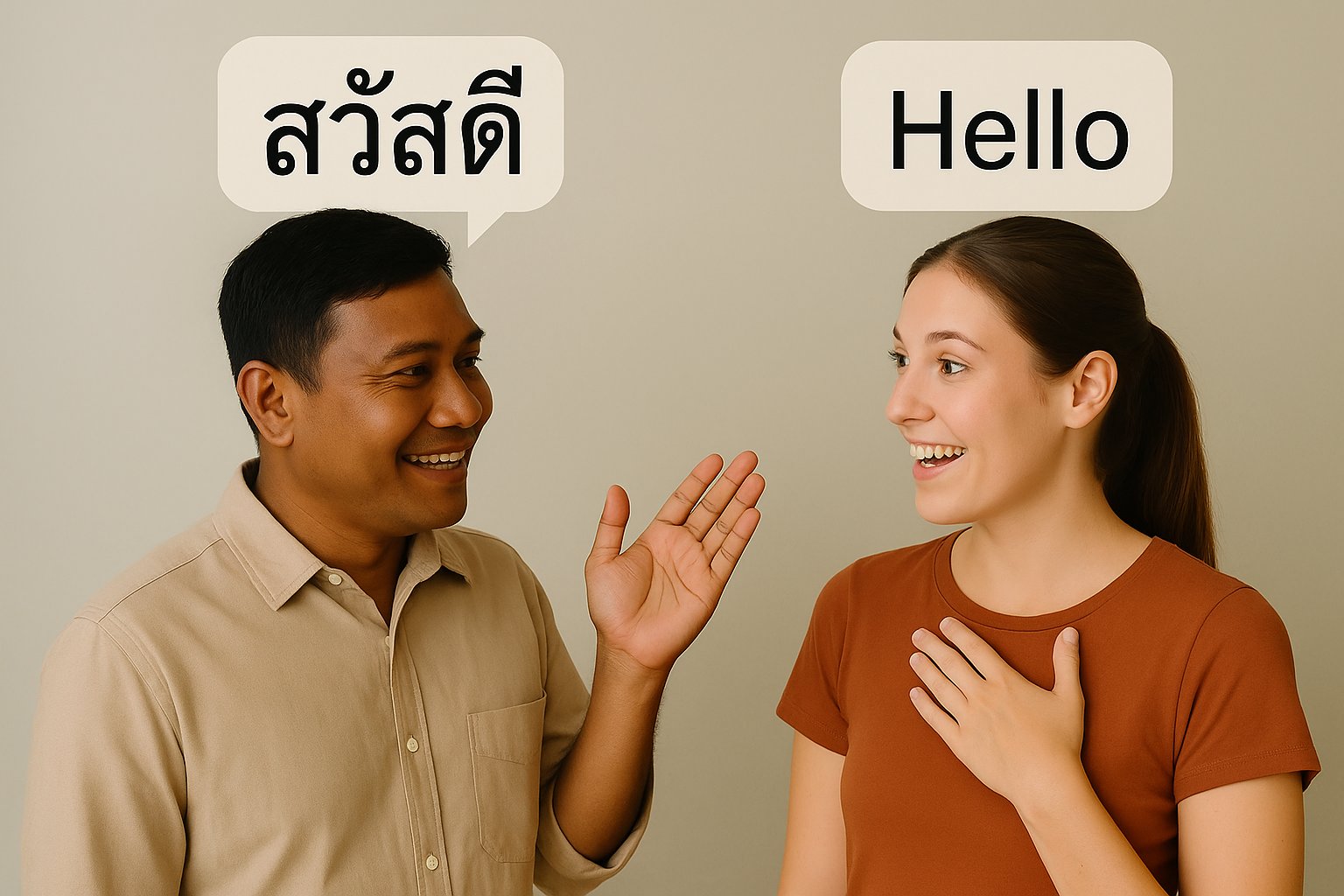
Visiting Bangkok is an unforgettable experience, even if you don’t speak the language! While Thai is the official language, you’ll find that English is widely spoken in tourist areas—especially in hotels, major attractions, shopping malls, and restaurants in places like Sukhumvit, Silom, or around the Grand Palace. That said, once you venture into more local neighborhoods, street markets, or hop on public buses, you may notice fewer English speakers and more reliance on smiles, gestures, and apps.
📱 Translation Apps That Help on the Go
- Google Translate: Works well for Thai, including text and voice translation. It also offers camera translation—super useful for reading menus or signs.
- Papago: Offers decent translations for short travel phrases and is more visually beginner-friendly.
- LINE: Popular messaging app in Thailand. Some hotels and tour companies communicate via LINE.
🙏 Cultural Communication Norms
- Thai people tend to be soft-spoken, polite, and indirect in conversation. Loud or confrontational speech is usually frowned upon.
- A traditional greeting is the wai—placing your palms together and giving a slight bow. You don’t have to wai everyone, but it’s a respectful gesture when greeting someone older or in a service role.
- Avoid pointing your feet at others or touching people’s heads—both are considered impolite.
- A smile goes a long way. It’s often used to ease awkward situations or to show friendliness.
📋 Useful Thai Phrases for Travelers
English Phrase | Thai Script | Romanization | When to Use 🕒 |
Hello | สวัสดี | Sà-wàt-dee | General greeting (add “kha” for women, “krub” for men) |
Thank you | ขอบคุณ | Khàawp-khun | After receiving service/help |
Yes / No | ใช่ / ไม่ใช่ | Châi / Mâi châi | Answering questions |
How much is this? | อันนี้ราคาเท่าไหร่ | An-níi raakhaa tâo-rài | While shopping |
Where is the toilet? | ห้องน้ำอยู่ที่ไหน | Hâwng-náam yùu thîi-năi | When nature calls |
I don’t understand | ฟังไม่เข้า | Fang mâi khâo | If someone speaks too quickly |
Can you help me? | ช่วยฉันหน่อยได้ไหม | Chûuai chăn nòi dâai măi | Asking for assistance |
I’m lost | ฉันหลงทาง | Chăn lŏng thaang | If you need directions |
🧳 Final Tip Before You Go
📸 Screenshot your hotel name and address in Thai—super helpful for taxis or if you get lost.
💡 Have a bilingual business card from your hotel or tour operator—many places hand them out at the front desk.
✍️ If you're stuck, show your translated phrase on your phone instead of trying to pronounce it—locals will usually appreciate the effort!
💳 Payment Methods & Popular Apps in Thailand
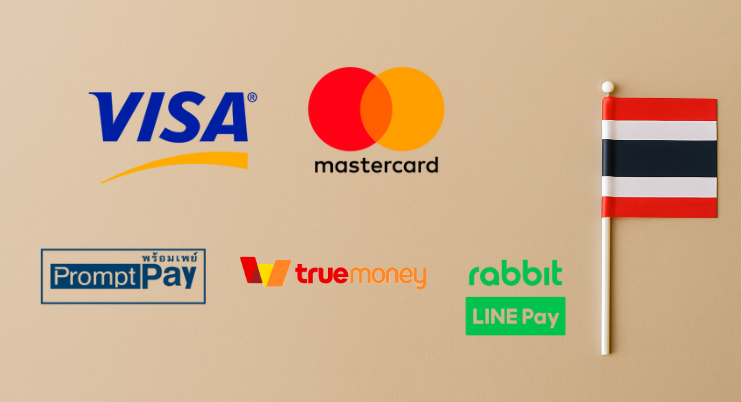
When traveling around Thailand, especially in cities like Bangkok, it helps to know how locals pay for things so you’re not caught off guard at the noodle stall or BTS station 🍜🚆. While digital payment is growing fast, cash still plays a big role—especially in markets and smaller vendors.
✅ Cash, Card, or Contactless?
- 💵 Cash is still king—especially in street food stalls, tuk-tuks, and local markets. Carry small notes for smoother transactions.
- 💳 Credit and debit cards are accepted at malls, hotels, and chain restaurants, but often not in small eateries or transportation.
- 📲 Contactless payments (Apple Pay, Google Pay, Samsung Pay) are gaining ground—mostly in Bangkok and touristy areas. Visa and Mastercard are more accepted than AmEx.
🔐 Pro Tip: Always carry a few hundred baht in cash—ATMs may charge foreign cards a 220 THB fee per withdrawal.
📱 Mobile Wallets & E-Payments
Thailand has embraced digital wallets in a big way, but most local apps require a Thai phone number or ID to register—so they’re often out of reach for short-term visitors. Here’s what to know:
- ✅ TrueMoney Wallet: Popular at 7-Eleven and some food vendors. Foreigners may face registration limits.
- ✅ Rabbit LINE Pay: Linked to the LINE app; used for BTS Skytrain payments and some food chains.
- ❌ PromptPay is locals-only, tied to Thai national IDs.
For tourists, your best bet is still cash or international cards—but always ask if they accept QR or contactless before tapping.
🏧 ATMs & Currency Exchange
- 💳 ATMs are everywhere, especially near 7-Eleven stores (which are literally on every block).
- Expect a 220 THB withdrawal fee per transaction on foreign cards. Try to withdraw larger amounts at once to avoid multiple fees.
- ✈️ Airport money changers are convenient but have less favorable rates. For better deals, use SuperRich Thailand or reputable changers in city malls or tourist hubs.
💡 ATM Safety Tip: Use machines inside bank branches or malls, not those on the street.
📲 Everyday Apps to Download in Thailand
Here are some super-handy apps locals (and savvy travelers) swear by in Bangkok:
App Type | App Name | Notes / Use Case |
E-Wallet | TrueMoney Wallet | Used in 7-Eleven and select vendors |
Ride-Hailing | Grab | Book taxis, motorbikes, or food delivery 🚗🍛 |
Food Delivery | Foodpanda | Urban food delivery from local restos |
Messaging | LINE | Standard for chatting, even with hotels 💬 |
Navigation | Google Maps | Great for BTS, MRT, and walking routes 🗺️ |
💡 Final Pro Tips Before You Go
✅ Download all your apps before arrival—registration may be smoother on your home network.
✅ Keep small bills (20, 50, 100 THB) for tuk-tuks, snacks, and tipping.
✅ Bring a backup card—some places randomly decline foreign cards due to banking filters.
💵 Tipping & Service Etiquette in Thailand
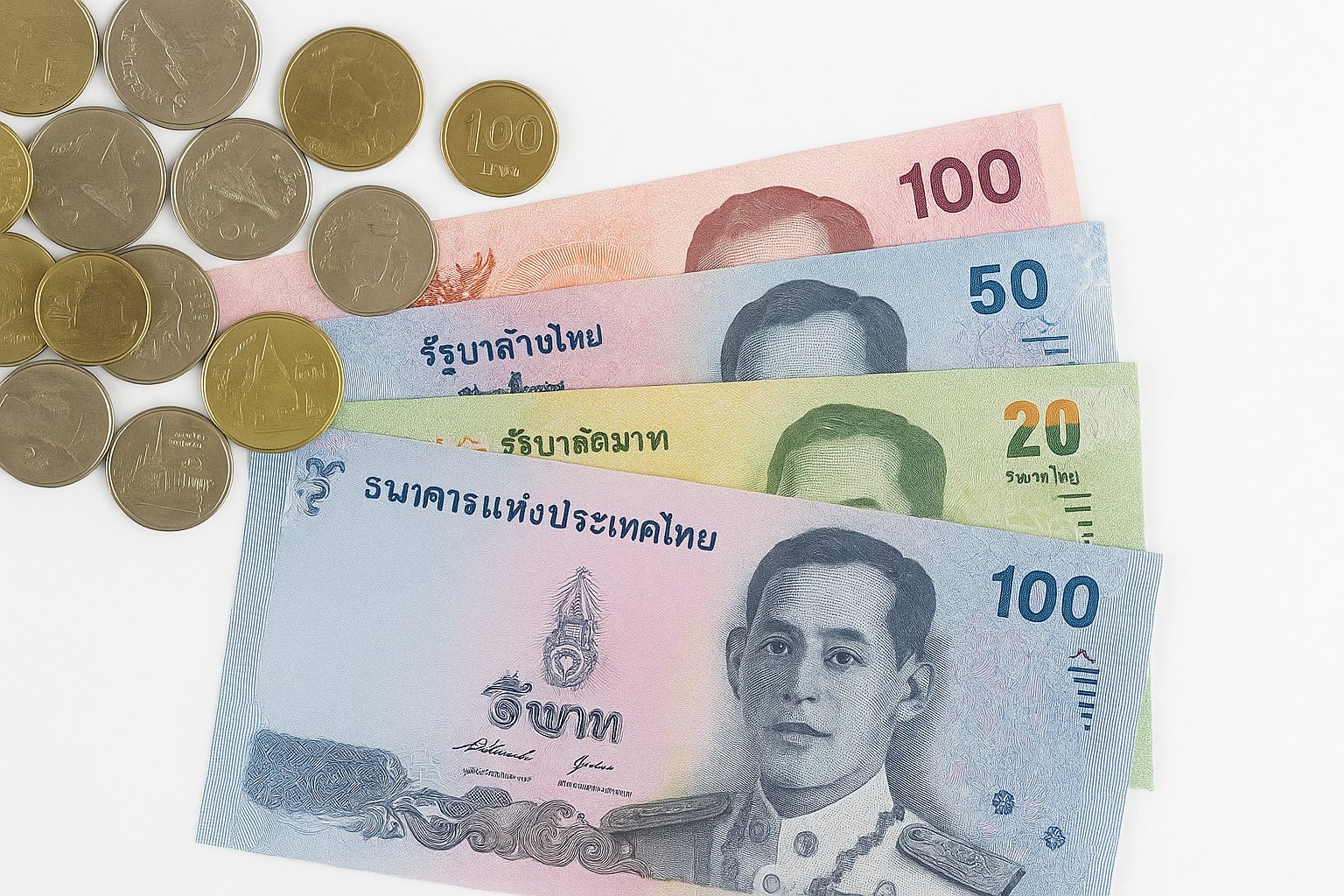
If you’re heading to Thailand and wondering about tipping, you’re not alone. Many travelers—especially those from no-tip or high-tip countries—aren’t quite sure what’s expected here. The good news? Tipping in Thailand is appreciated but not mandatory 😊. You won’t offend anyone if you don’t tip, but leaving a small token of thanks is seen as a kind gesture—especially in service-heavy settings.
✅ Where and How Much to Tip
Here’s a quick cheat sheet based on common travel situations:
Service Type | Tipping Guideline | Notes |
🏨 Hotels | 20–50 THB for bellhops, 20–50 THB/day for housekeeping | Leave cash in an envelope or bedside table |
🍽️ Restaurants | Round up or leave 10% | If there’s a 10% “service charge” already on the bill, no need to add more |
🚕 Taxis/Grab | Round up to nearest 10–20 THB | No tipping button in Grab app—tip in cash if you wish |
💆♀️ Spas & Salons | 50–100 THB per treatment | Slip it to the therapist or leave at the front desk |
🍲 Street Food Vendors | Not expected, but rounding up is a nice gesture | Most people don’t tip here |
✅ How to Tip in Thailand
💵 Cash is king for tipping. There's no widespread tipping via apps or credit cards.
🧧 For hotels, leave tips in small envelopes or neatly placed on the bedside table.
✋ It’s okay to hand the tip directly to the person if appropriate. A smile and slight bow (“wai”) goes a long way too 🙏.
📱 Grab and Foodpanda don’t have built-in tipping functions, so any tip has to be in cash.
⚠️ Cultural Notes & Cautions
🪙 Avoid tipping with coins—they’re seen as small change or impersonal.
😌 Some Thais may politely refuse a tip at first out of humility. Don’t be discouraged—it’s just part of local manners.
🚫 Over-tipping (e.g., large bills for small favors) can make locals uncomfortable or seem showy.
💡 Final Tipping Wisdom
If you’re ever unsure:
“Round up a little, and smile.” That’s more than enough 🙏
No one expects big tips—small, sincere gestures are what matter in Thailand.
🚨 Safety & Emergency Info in Thailand
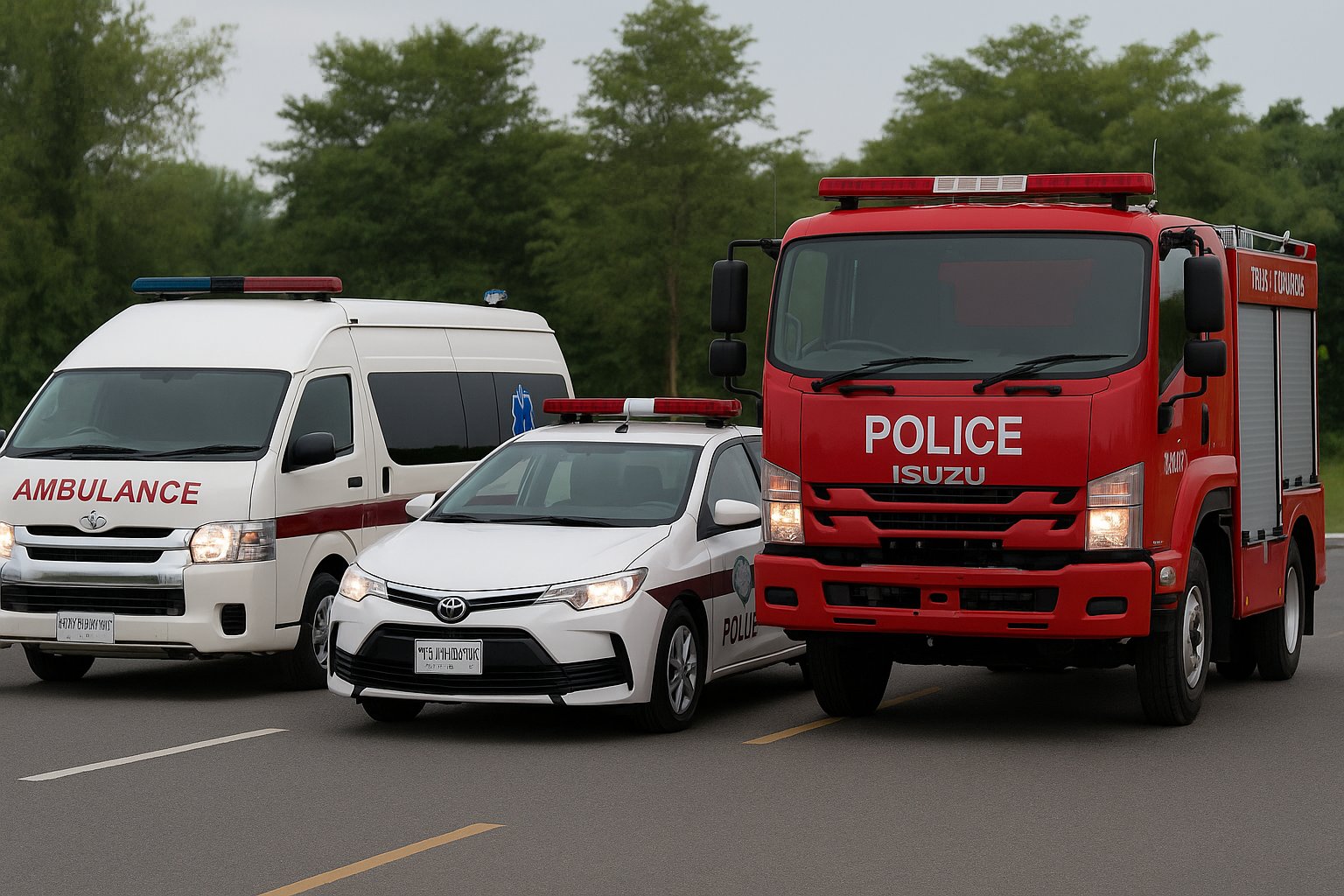
Most Indonesian travelers find Thailand to be a very safe country, especially in popular areas like Bangkok, Chiang Mai, and Phuket. Just like back home, you’ll often feel comfortable walking around—even at night. That said, every destination has its own quirks, so it helps to know a few key things ahead of time. That way, you can focus on enjoying the fun parts of your trip 🎒🌴
🛡️ Smart Safety Tips for Travelers
Here are a few simple habits that go a long way:
- 👜 Keep your bag zipped and in front of you in markets or transit stations.
- 🚕 Use ride-hailing apps like Grab instead of hailing taxis on the street.
- 🌙 Avoid dimly lit alleys or walking solo in quiet areas late at night.
- 💍 Don’t flash expensive jewelry or gadgets—it attracts the wrong kind of attention.
- 🛵 Always wear a helmet if you rent a scooter (and check your insurance!).
☎️ Emergency Numbers in Thailand
Emergency Type | Local Number | Notes |
👮 Police | 191 | For theft, accidents, or suspicious activity |
🚑 Ambulance | 1669 | Some public hospitals may require payment upfront |
🚒 Fire | 199 | Rarely needed, but helpful to know |
☎️ Tourist Hotline | 1155 | 24/7 English-speaking assistance from Thai Tourist Police |
📱 Tip: Save these numbers in your phone contacts before traveling.
🏥 Clinics, Hospitals & Pharmacies
Thailand has excellent private hospitals, especially in Bangkok and Chiang Mai—many with English-speaking staff and short wait times 🏥🇬🇧. Pharmacies (often marked with a green cross) are everywhere and open late in tourist zones.
- Pack basics like painkillers, motion sickness meds, and antihistamines—labeling might be in Thai.
- Some pharmacies can diagnose minor issues, but it’s good to bring prescriptions from home if needed.
🌏 Local Culture Note
Thais are known for their calm, polite demeanor—public arguments or confrontations are very rare. If you get lost or need help, locals may not speak fluent English, but many will go out of their way to assist you with a smile 😊. A little patience (and Google Translate) goes a long way.
👍 Final Reassurance
Thailand is generally a very safe and welcoming country for travelers—just stick to common-sense precautions and you’ll have an amazing, stress-free trip 🧳🌅.
Want to download a printable emergency cheat sheet or phrase card? I can help with that too!
🙏 Cultural Etiquette & Local Customs in Thailand
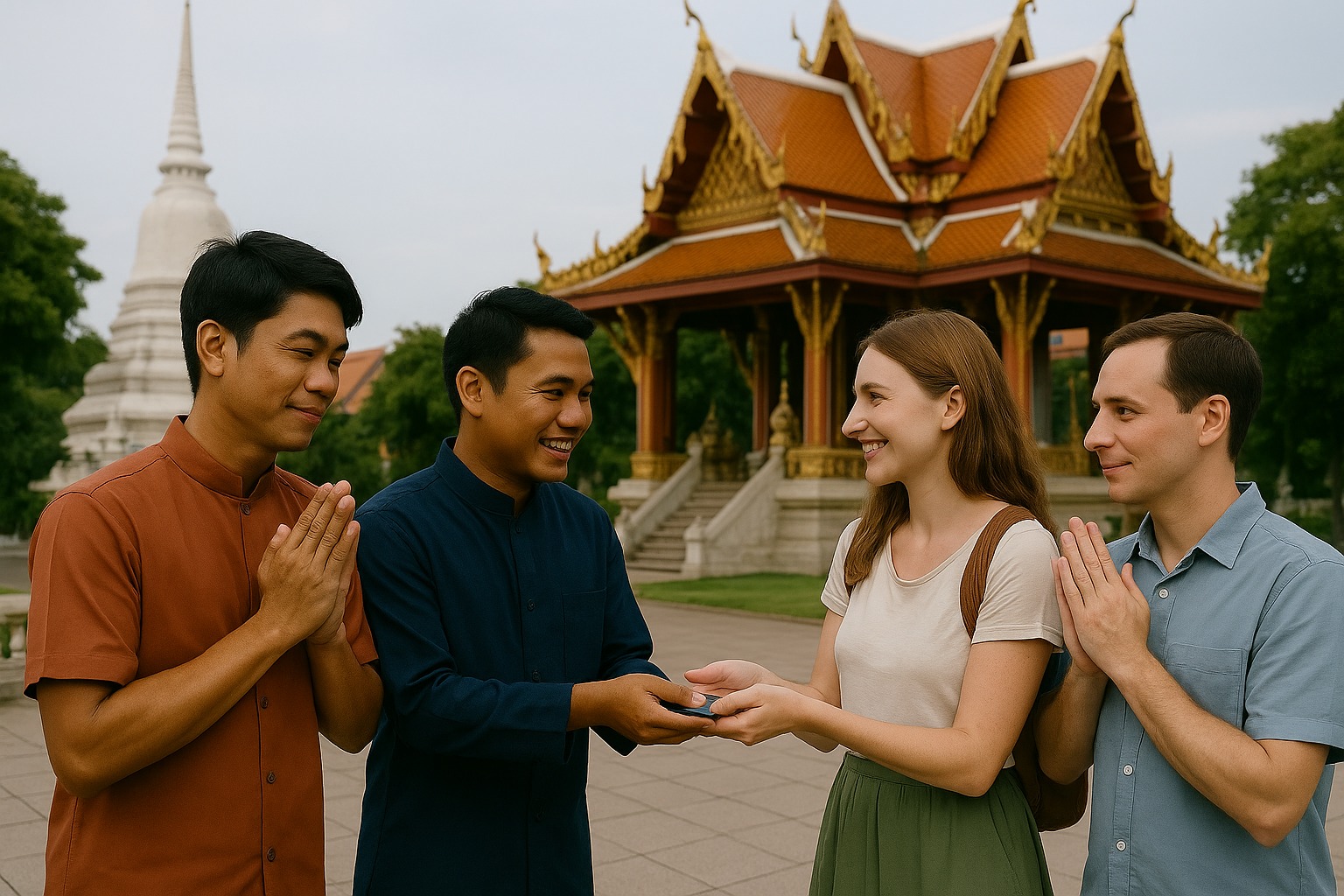
If you’re heading to Thailand, you’re in for an incredible cultural experience! 🇹🇭 Thai people are known for being polite, calm, and respectful, and the social atmosphere is generally warm but more reserved than what many Indonesians might be used to. Think of it like meeting someone older for the first time—friendly, but with a touch of formality.
✅ Do’s & Don’ts to Keep in Mind
Here are a few quick etiquette tips to help you blend in and avoid awkward moments:
👍 Do | 🚫 Don’t |
Take off your shoes before entering someone’s home or temple 👟 | Touch someone’s head—even kids' 🙅♂️ |
Use both hands when giving/receiving items 🤲 | Point your feet at people or sacred objects 🦶 |
Smile—it’s part of Thai communication 😊 | Show anger in public (it’s considered disrespectful) 😤 |
Say “Sawasdee” with a respectful wai 🙏 | Display excessive affection in public 💏 |
Dress modestly when visiting temples or rural areas 🛕 | Step over someone sitting on the floor 🚫 |
🍽️ Dining Etiquette in Thailand
Meals in Thailand are often shared family-style, and it’s common to order several dishes for everyone to try. People usually eat with a fork and spoon (not chopsticks, except for noodles 🍜), and the fork is only used to push food onto the spoon.
Wait for the elders or host to start eating first, and don’t take the last piece of a shared dish unless it’s offered to you. Slurping is not rude, but eating quietly is more typical than in Indonesia.
👕 Dress Code & Body Language
- Temples and sacred sites: Wear clothing that covers your shoulders and knees. Bring a sarong or scarf just in case. 🧣
- Public places: Casual wear is fine, but avoid overly revealing outfits, especially in rural areas.
- Gestures to avoid: Don’t beckon someone with your palm up or point at things with your feet. Crossing your arms while talking can also seem dismissive.
👋 Greeting & Interaction Norms
Thai people greet each other with a “wai” gesture—palms pressed together and a slight bow of the head. As a visitor, returning the gesture (especially to elders or officials) is respectful 🙏.
While small talk is appreciated, Thais often avoid confrontation or direct criticism. Politeness is highly valued, and speaking softly and with a smile goes a long way 😊.
🌏 Cultural Curiosity Note
Even simple efforts like saying “Sawasdee kha” (for women) or “Sawasdee krub” (for men) when you enter a shop or greet someone show great respect. Locals really appreciate when visitors try to understand their culture—and they’re happy to help if you ask kindly!
📅 Public Holidays & Travel Seasons in Thailand
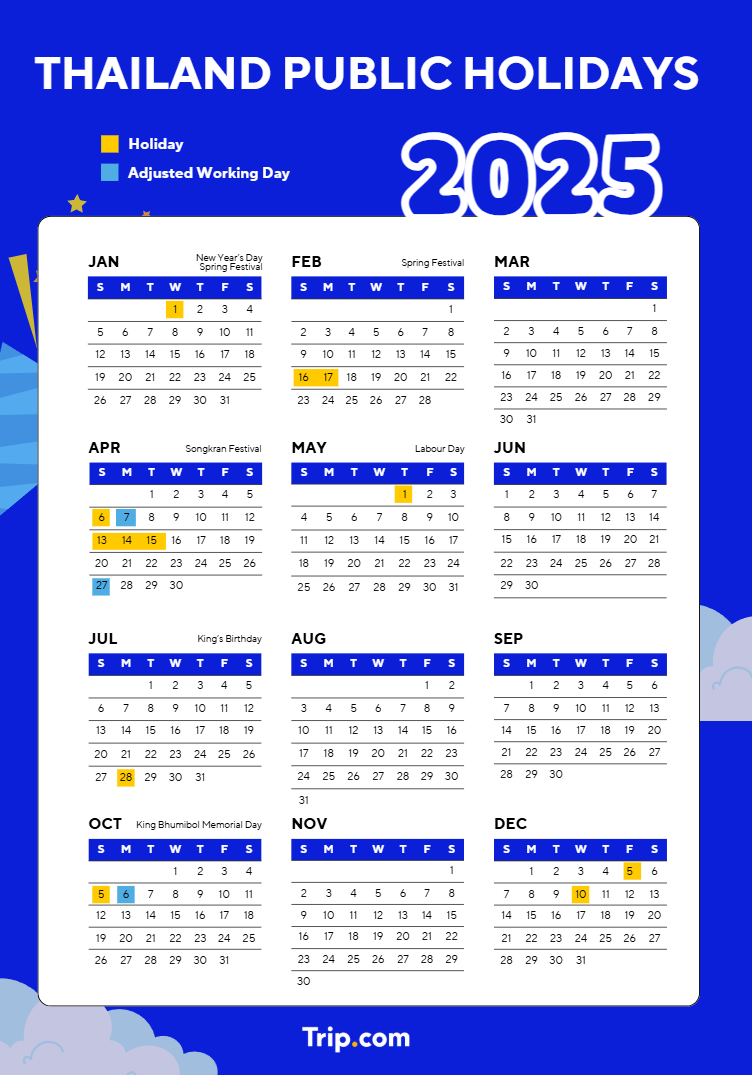
✅ Major Public Holidays to Watch
- Songkran (Thai New Year) – April 13–15
Expect nationwide water fights 💦, packed streets, and busy domestic travel. It’s fun and festive—but not ideal if you dislike crowds or getting soaked! - Loy Krathong – November (date varies)
A stunning lantern and river festival 🏮 celebrated across Thailand. Chiang Mai and Sukhothai are especially beautiful—but also get booked out early. - Makha Bucha Day – February (lunar calendar)
A quieter Buddhist holiday with candlelit processions at temples 🕯️. Some bars and clubs may close temporarily.
🧳 Travel Impact & Local Tips
- Transport: Book flights and trains well in advance during holiday periods ✈️🚆
- Hotels: Prices surge in tourist hotspots during major festivals and long weekends 🏨
- Closures: Government offices and some businesses may shut down—plan errands ahead 🛑
- Experience Factor: Songkran is worth attending at least once—but avoid if you’re not into big crowds or wet fun.
📆 When to Visit: Seasonal Snapshot
- High season: November–February ☀️ (cooler weather, lots of tourists)
- Shoulder season: March & October 🌤️ (fewer crowds, still good weather)
- Low season: May–September 🌧️ (rainy, but budget-friendly and lush)
🧭 Pro Tip: If you’re planning around peak travel dates or hoping to catch local celebrations, check out our full guide to public holidays in Thailand
📱 eSIM, Wi-Fi & Connectivity in Thailand
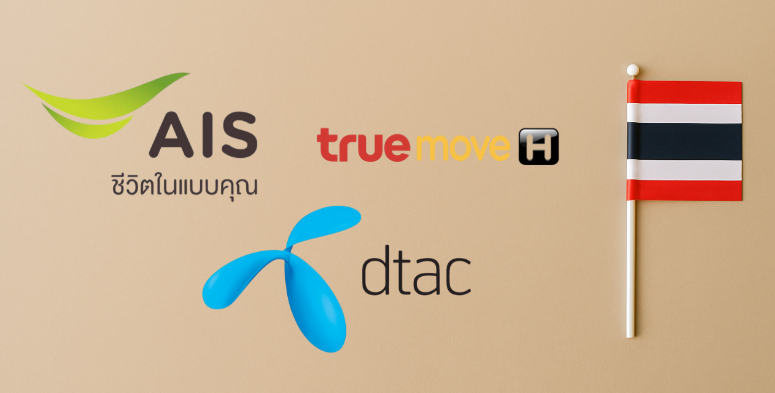
Staying connected in Thailand is pretty straightforward, whether you prefer an eSIM or a traditional SIM card. If you’re on a short trip, eSIMs are gaining popularity—most newer phones support them, and you can often activate your plan right before you land via apps. That said, local physical SIM cards remain super common and easy to grab once you arrive.
✅ Top SIM Providers in Thailand
- AIS – Excellent coverage nationwide, including rural areas. Great prepaid tourist packages with plenty of data.
- TrueMove H – Popular for fast 4G/5G and good value bundles. Tourist SIMs available at airports.
- Dtac – Reliable coverage in cities and popular tourist spots, with flexible prepaid plans.
📍 Where to Buy Your SIM or eSIM
Grab your SIM card at Bangkok’s Suvarnabhumi or Don Mueang airport counters, convenience stores like 7-Eleven, or official carrier kiosks around town. Passport registration is mandatory for SIM activation. If you prefer eSIM, you can buy and install it ahead of time through various apps or platforms—look for “eSIM for Thailand” deals online to skip airport queues.
🌐 Wi-Fi & Internet Access
Free Wi-Fi is common in hotels 🏨, cafés ☕, shopping malls, and many restaurants. Public transport like the BTS Skytrain also offers Wi-Fi, though speeds vary. No VPN is needed for popular sites and apps like Google, WhatsApp, and Facebook, making browsing hassle-free.
💡 Pro Tips
- Download offline maps and translation apps before you go 🗺️
- Keep a backup connection option like a pocket Wi-Fi device if you plan to visit remote areas
- Check out Trip.com’s eSIM plans for Thailand—they’re perfect if you want to skip the airport hassle!
Final Travel Advice & Helpful Links for Thailand 🧳🌏
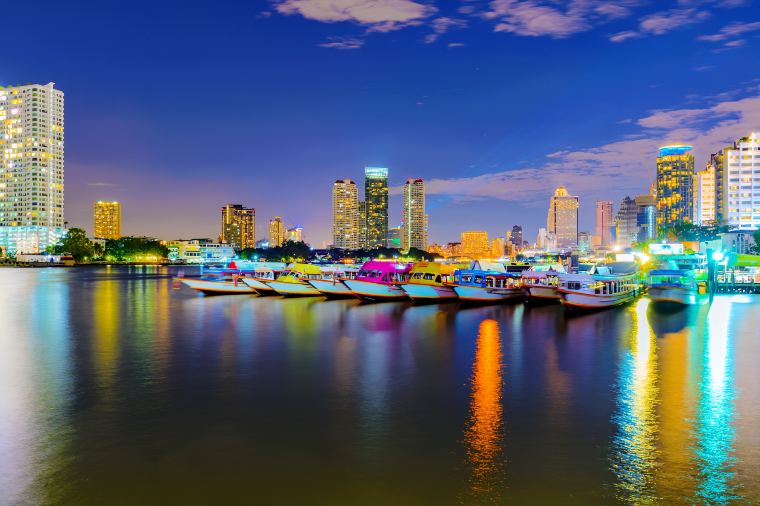
You’re all set! With these tips in hand, you can confidently explore Thailand like a pro. Sometimes it’s the small things—knowing how to get around Bangkok’s bustling streets, understanding local tipping customs, or having the right apps ready—that make your trip smoother and way more enjoyable.
Every region of Thailand has its own unique vibe, from the vibrant city life of Bangkok to the peaceful beaches of Krabi and the cultural richness of Chiang Mai. Part of the adventure is discovering these local differences and surprises along the way.
When you’re ready to keep planning, don’t forget to check out flights to Thailand ✈️, hotels in Thailand 🏨, and things to do in Thailand 📍 to make your journey even easier.
Have a great trip, and enjoy every moment of your adventure in Thailand! 🌟
FAQs: Travel Tips To Bangkok
What’s the best time to visit Bangkok?
Cool season (Nov–Feb) is the most pleasant with lower humidity and temperatures around 25–30°C. It’s also peak tourist season.Do I need a visa to visit Thailand?
Many nationalities (including the US, UK, EU, Australia, Japan, Indonesia, Malaysia) can enter visa-free for up to 30 days (via air) or 15 days (via land). Always check the latest requirements from official Thai immigration sites.What’s the currency, and can I use credit cards?
Thai Baht (THB) is the local currency. Credit cards are widely accepted in malls and hotels, but cash is king in street markets and smaller restaurantsIs Bangkok safe for tourists?
Generally very safe, but watch out for petty theft in crowded places. Avoid scams like overly friendly tuk-tuk drivers offering "cheap" tours or gem shops.Can I use my phone and get internet?
Yes, get a Thai SIM card at the airport or convenience stores. AIS, TrueMove, and DTAC offer great packages for tourists.
